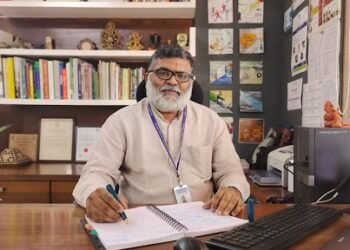In the six years from mid‑2014 to mid‑2020, S M Sehgal Foundation (Sehgal Foundation) development projects with various CSR partners have benefited 73,879 people in 696 villages of Bihar. Sehgal Foundation implements CSR projects to enhance the economic independence and quality of life of small and marginal farmers in villages of Bihar. This is especially pertinent as there is limited attention within the country’s CSR endeavors to benefit this large sector in need of development.[1]
The farming practices carried out by most of the rural population are traditional and suboptimal, yielding 30 to 50 percent of the highest average yield in the world. An intervention at the grassroots can have a revolutionary impact. If a farmer with small landholdings becomes competitive, the entire development perspective of the nation will change. If the small farmer makes a consistent profit, the rural economy will boom and create a base for the country to move upward toward becoming a developed country.
With this lofty view in mind, a small step in that direction was made by converging several key initiatives in the villages of Bihar based on a model developed by Sehgal Foundation across many locations in India with the participation of various communities. These activities and this implementation approach are cost-effective based on the principle of “small interventions make big impact.” This includes promoting a scientific package of practices for various crops with micronutrients, macronutrients, farm mechanization, crop diversification, kitchen gardens, goat rearing, animal husbandry, health initiatives, and others.
Though Bihar has tremendous potential in terms of resources such as land, water, climate, and people, yet it needs faster growth.[2] About 80 percent of the state’s population is employed in agriculture and most of the farmers belong to socially deprived and historically disadvantaged communities, yet these farmers contribute enormously to the food security of the nation.[3] However even though Bihar lags behind other Indian states in social and economic development, it is one of the most promising states in terms of agricultural growth and agrarian prosperity.
Villages in seven districts of Bihar were selected as the area of operations based on the low development indices and need: Sitamarhi, Muzaffarpur, Samastipur, East Champaran, Darbhanga, Vaishali, and Begusarai. Several districts, including Muzaffarpur and Sitamarhi, were identified as aspirational districts by Niti Aayog in March 2018. Aspiration districts are being encouraged by the government on a priority basis to catch up with the best district in their state and subsequently aspire to becoming one of the best in the country. However some of districts have regular droughts and floods, malnutrition among children, acute encephalitis syndrome disease in some pockets, and the toilet facilities and literacy levels, especially among women, need to be improved.
Secondary data indicates that the drinking water in the districts of Bihar has higher than permissible levels of biological contamination, turbidity, iron, and arsenic, causing numerous ailments.[4] World Health Organization notes, “Lack of safe water perpetuates a cycle whereby poor populations become further disadvantaged, and poverty becomes entrenched.”[5] This phenomenon occurs due to the loss of livelihood income during illness and increased financial stress caused due to treatment costs.
Therefore the CSR efforts targeted agriculture, water management, and good rural governance, and the benefits accrued for the six years described are as follows.
| Mid-2014–Mid-2020 | |
| Intervention | Numbers |
| Villagers benefited | 73,879[6] |
| Farmers who benefited by adoption of farm mechanization machines, package of practices demonstrations, orchards, government linkages, and training and exposure visits | 27,173 |
| Villagers and students trained on safe drinking water | 38,657 |
| Families who installed water filter for safe drinking water | 2,658 |
| Community leaders trained including health volunteers | 1,304 |
| Panchayat representatives trained | 20 |
| Women who benefited from goatery, kitchen gardens, and health interventions | 4,779 |
| Families benefited by Animal Health Camps and animal nutrient management | 2,499 |
| Farmers registered at a mobile agri clinic | 6,073 |
| Students made digitally literate (ongoing activity) | 80 |
| Phone calls to Citizen Information and Support Centre (CISC) | 9,937 |
| Families benefited by garbage management initiative | 350 |
| Villager who benefited by better access to government programs | 1,470 |
| Awareness of COVID-19 and relief distribution | 1,332 |
Nagendra Sahni, the son of Jai Narayan Sahni, is a small farmer from Bariarpur, Motipur block, Muzaffarpur. He tried out a zero-tillage machine on one acre of his wheat field as part of the project Gram Uthan Pariyojna. With this technique, Nagendra obtained a 2-quintal increase of yield and saved INR 3,200 in farming cost, which included the cost of seed, plowing, and irrigation. All together he made a profit of INR 7,680 by using the zero-tillage method.
Susheela devi and her husband Sitaram Giri are laborers from Kharika village of Minapur block of Muzzafarpur. They could not afford to purchase adequate vegetables due to their high cost. On 19 April 2018, Susheela devi received seeds of twelve types of vegetables and training on how to grow them for a kitchen garden. Consequently she started harvesting 2 kgs of vegetables daily, due to which vegetables are now consumed in her family every day throughout the year. Due to her kitchen garden, Susheela devi saves around INR 1,500 per month on the purchase of vegetables, which amounts to about INR 18,000 in a year. She has collected some seeds from her vegetables and plans to use them in her kitchen garden next year.
On 25 Febuarary 2018, a Kisan Goshti was organized at Bediban, Block Chakia, in East Champaran, as part of the Samagra Krishi project. This provided a platform to project stakeholders, farmers, officials from government departments, scientists from various research institutes, public representatives, and policy makers to share their experiences of the project. Shri Radha Mohan Singh, Honorable Union Minister, Agriculture and Farmer Welfare, Government of India, was the chief guest of the event. He appreciated the work done under this project and was hopeful that in its next phase it would further help many more farmers in the region. About 500 farmers attended the event, and a booklet on the success of the project interventions was released during the event.
“JalKalp filter has been a boon to me and my family. Previously we used to drink water straight from the hand pump without getting it filtered, or we purchased bottled water which is expensive. The water here is only suitable for drinking if it is dug from a depth of 200–250 meters, which is sometimes difficult and is not entirely safe for consumption. But when I attended a community meeting organized by the project team, I came to know about the JalKalp filter, which was easy to afford, unlike other filters. The team demonstrated the mechanism of the filter, and I was impressed. So I decided to install it at my home. Because of the filter, water from 20–25 meters underground can also be collected for filtration. JalKalp has reduced the incidences of health problems in our family.” Shambhu Prasad, Kharika village, Minapur block, Muzaffarpur.
Jhola devi, is a member of the Women’s Leadership School (WLS) of Pakhna of Minapur block, Muzzafarpur. During a training session she brought up the issue of most people in her village not availing the National Health Authority’s Ayushman Bharat Pradhan Mantri Jan Arogya Yojana, due to a lack of knowledge on how to procure the required “golden” card. Through this scheme, the poor can obtain health insurance up to INR 5 lakhs per family in designated government hospitals. The WLS trainees organized a one-day camp on 8 April 2019, which was attended by sixty-four families. Fifty-three golden cards were made, and the initial documentation was put in place for other families to procure these cards in future.
If sustainability issues are not addressed, project benefits decline very fast and all the money invested can go to waste. Sehgal Foundation’s sustainability strategy includes (i) capacity building of communities and panchayat on a vision of development in the village, their planning development activities, and identifying actions for achieving the plans in order to take ownership of development in their village, (ii) formation of an institution of trained village leaders with significant women’s representation to support the gram panchayat in the development work, and (iii) forming linkages with the government for garnering funds from various schemes and programs. Post project, the knowledge, skills, and leadership are sustainable elements left behind in the villages.
The future CSR strategy for Bihar involves including more intensive work in the currently selected villages and expanding to more villages and districts with a focus on empowering women through all the activities. This can be achieved by building new partnerships and strengthening existing ones.
New initiatives like the promotion of high-value crops such as vegetables, medicinal and aromatic crops, capacity building of women farmers, strengthening market linkages, and forwarding integrated village development will be innovated and pilot-tested. Systematic impact assessment with a strong in‑house management information system (MIS) at Sehgal Foundation is key to learning from the project work and using the learning in other parts of Bihar and India.
The successes will be showcased to the district administration and local NGOs; and based on evidence-based research and experiences, policy-level recommendations will be made to the government. The linkages with the government will be strengthened by facilitating interface workshops with government officials and villagers, and conferences/seminars will be planned for exchanging learnings and creating platforms for networking and visibility. The work in Bihar will provide an experience-based model that can be replicated in similar geographies.
About the Authors: Ellora Mubashir has a science PhD from Jawaharlal Nehru University, Delhi, and has worked in rural development as a communications specialist for about two decades. She is currently working with S M Sehgal Foundation. Rahul Kumar has completed Masters in Social Development from University of Sussex, United Kingdom and has worked with organisations such as UNDP, UNICEF, Asian Development Bank and PRADAN. He has work experience of more than 12 years and he is currently a program leader at S M Sehgal Foundation.
[1] All project overhead is absorbed by Sehgal Foundation so the entire external CSR funding goes into direct project implementation.
[2] Niti Aayog in 2018, see http://www.thehindu.com/news/national/pm-wants-all-ministries-to-work-on-backward-districts/article22413281.ece.
[3] See http://krishi.bih.nic.in/.
[4] Districts with iron contamination compiled from: CGWB Report “Groundwater quality in shallow aquifers of India,” (2010). Accessed from: http://cgwb.gov.in/documents/waterquality/gw_quality_in_shallow_aquifers.pdf.
[5] WHO, 2007. Combating waterborne disease at the household level/International Network to Promote Household Water Treatment and Safe Storage.
[6] Large part of the population of the target villages.






















